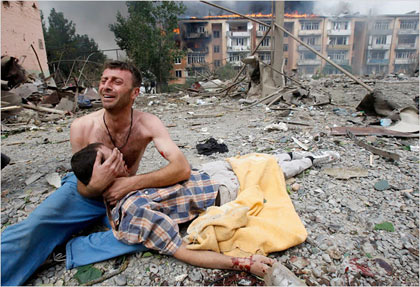You are hereWcP.Tomorrows.History's blog
WcP.Tomorrows.History's blog
US tied up in Iraq. China focused on Olympics. Russian tanks & troops into Ossetia, part of former Soviet republic of Georgia
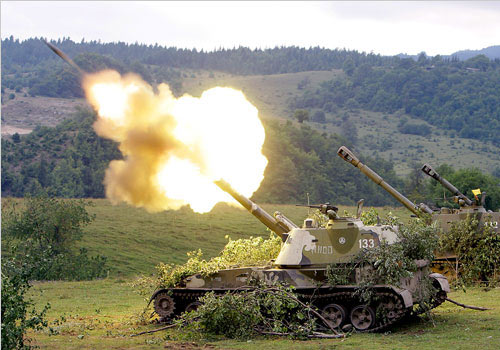
(quote)
Prime Minister Vladimir V. Putin of Russia declared that "war has started."
Shortly before dawn on Sunday, Georgia’s Interior Ministry said that Russian bombers had begun striking military facilities adjacent to the civilian airport at Tbilisi. The explosions could be heard in the city, said Shota Utiashvili, a ministry official. He said that Russia had built up large forces in Abkhazia and South Ossetia — breakaway regions that have support from Moscow — including as many as 300 artillery pieces in South Ossetia alone. Russian forces, he said, were also poised just over the border at Larsi, a checkpoint, where they could open a third line of ground attack. As Russia moved more forces into the region and continued aerial bombing, it appeared determined to occupy both South Ossetia and Abkhazia.
Georgia’s president, Mikheil Saakashvili, said Russia’s ambitions were even more extensive. He declared that Georgia was in a state of war, and said in an interview that Russia was planning to seize ports and an oil pipeline and to overthrow his government.
Electric and fuel-sipping scooters, cute and cool win favors. When market changes, so does a driver's heart
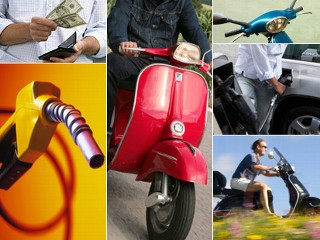
(quote)
Imagine filling up your gas tank for less than $15. Some Americans are doing it — and they're doing it on two wheels.
Motorized scooters have emerged as the new transportation of choice for some Americans fed up with gas prices that have surged past $4 a gallon. Though the small, zippy vehicles aren't ideal for every purpose, some owners say they're great for short trips and running errands.
Chris Maxwell recently purchased a Yamaha Majesty scooter to ride around the small town of Natchez, Miss. His wife, Emily Maxwell, appreciates how much the couple saves on gas purchases. "It gets 50 to 60 miles a gallon in town and a full tank lasts two to three weeks," she said. "Right now it costs under $12 to fill it up, so we immediately get a $200 a month 'pay raise' from the lower fuel costs."

Shawn Pointer, of Kenosha, Wis., said he often straps in his four-pound Chihuahua, Missy, for rides down to a local river on his 2007 Honda Metropolitan. Pointer bought the blue and white scooter for $1,600 but pays only about $10 a month to fill its 1.2 gallon tank. The scooter gets roughly 100 miles a gallon so he can travel 120 miles for $4. The same trip in the typical car would cost nearly $18. read more »
Sound familiar? In 80s, massive oil shortage, prices soared; economies into recession; prices flattened out, in 1985, collapsed

(quote)
The world's thirst for oil is growing so quickly humanity will consume more of it this decade than over the previous hundred years. Production can't possibly keep up. And the consequences will be dire. "This surge of demand will soon begin to send shock waves through the American economy and transportation system," wrote one expert. The American interior secretary agreed.
A massive oil shortage was coming in the 1980s. Everyone knew that. But before the predicted crisis could arrive, the world was hit with one that wasn't predicted: The Iranian revolution of 1979 turned a major American ally into a major American enemy. Oil prices soared. Economies slipped into recession.

Experts were certain the age of scarcity had arrived ahead of schedule. "The cardinal issue is how vicious the struggle for energy supplies will become," the head of the CIA told a Senate committee. In the summer of 1980, the journal Foreign Affairs captured the dismal mood in an article headlined "Oil and the Decline of the West."
Then a funny thing happened. The price of oil stopped rising. Instead, it fell. And fell some more. High prices had encouraged oil companies to explore like never before and producers to open their spigots. Supply gushed onto the market.
In 1985, the price of oil collapsed.
(unquote) read more »
June 12 - US Supreme Court delivers its third consecutive rebuff to Bush Administration's handling of detainees
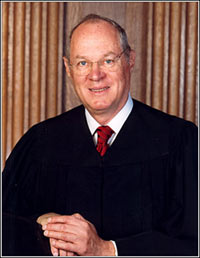
(quote)
WASHINGTON — The Supreme Court on Thursday delivered its third consecutive rebuff to the Bush administration’s handling of the detainees at Guantánamo Bay, ruling 5 to 4 that the prisoners there have a constitutional right to go to federal court to challenge their continued detention.
The court declared unconstitutional a provision of the Military Commissions Act of 2006 that, at the administration’s behest, stripped the federal courts of jurisdiction to hear habeas corpus petitions from the detainees seeking to challenge their designation as enemy combatants.
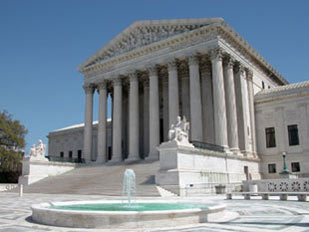
Writing for the majority, Justice Anthony M. Kennedy said the truncated review procedure provided by a previous law, the Detainee Treatment Act of 2005, “falls short of being a constitutionally adequate substitute” because it failed to offer “the fundamental procedural protections of habeas corpus.”
Justice Kennedy declared: “The laws and Constitution are designed to survive, and remain in force, in extraordinary times.”
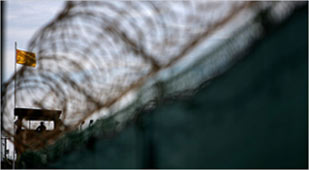
'Habeas corpus' (Latin: [We command] that you have the body) is the name of a legal action, or writ, through which a person can seek relief from unlawful detention of themselves or another person. The writ of habeas corpus has historically been an important instrument for the safeguarding of individual freedom against arbitrary state action. read more »
Ethnic Han Chinese and Tibetan mountaineering team of 19 carried Olympic flame to top-of-world 29,035-ft mountain
(quote)
BEIJING (AP) — An Olympic flame reached, and was lit up on, the top of the world Thursday. The 19-member mountaineering team was comprised of both ethnic Han Chinese and Tibetan members and also included university students - the team captain, Nyima Cering, is a Tibetan, while deputy Luo Shen is Han Chinese. All dressed in red parkas emblazoned with Olympic logos, broke camp before dawn and reached the top of the 29,035-foot mountain a little more than six hours later.
The Everest torch is separate from the main Olympic flame, which was not taken up the mountain because of weather concerns. A delay due to bad weather would have thrown the schedule off for the whole torch relay. The Olympic flame had been carried in a special metal canister during the ascent. As the team neared the top, they used a wand to pass the flame from the canister to the torch, which had been designed to withstand the strong winds and low oxygen levels at the top of Everest.
A colorful Tibetan prayer flag lined the path and fluttered in the wind. The climbers could be heard struggling for breath (live television) as five torchbearers each inched a few feet before passing on the flame to the next person. The final torchbearer, a Tibetan woman named Cering Wangmo, stood on the peak with the torch while other team members unfurled flags Chinese and Olympic flags. They then clustered together, cheering "We made it," and "Beijing welcomes you." One person was heard breathing heavily, murmuring "not enough oxygen." The head of the Everest leg of the relay, Li Zhixin, was overcome with emotion as the flame reached the top. "It's so hard," he said at the CCTV studio set up at base camp, choking on tears.
(unquote)
Photos courtesy of Xinhua News
Soft-spoken former lawyer is Russia's new president, teams up with Putin as PM, different in style
"MOSCOW (Reuters) - A diminutive, soft-spoken former corporate lawyer, Russia's new president Dmitry Anatolyevich Medvedev is an unlikely figure to lead the biggest country on earth.
The first Russian leader in generations to have worked in the private sector, Medvedev, 42, was to be sworn in as president on Wednesday in a lavish televised ceremony in the Kremlin.
He secured the post after the popular outgoing leader Vladimir Putin endorsed him as his preferred successor, ensuring an overwhelming victory at the polls in March.
Medvedev has repeatedly cast himself as a continuity candidate who will follow the course set by Putin -- a popular line in Russia, where most of the population has benefited from rapid economic growth and rising incomes under Putin.
Further underlining continuity, Putin will stay on as Medvedev's prime minister and as leader of the United Russia party, which holds a big majority in the lower house of parliament.
But the two men differ radically in background, upbringing and style.
Putin was proud of his past as a KGB agent in former East Germany and loved posing for pictures flying fighter jets or standing aboard nuclear submarines. Medvedev has no known link to the secret services and has never served in the army.
A bookish child born to two university professors, Medvedev grew up in a modest, middle-class household. His speeches reflect his educated, lawyerly background and are laced with long, complex sub-clauses."
Photos courtesy of AP

